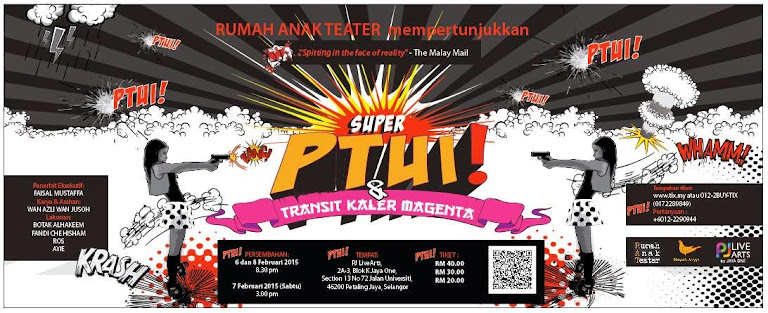Malaysian Insider
MARCH 4 — The applause was not as robust as I felt it was going to be.
After over an hour of thought-provoking and entertaining theatre, presented by an ensemble that didn’t lack either talent or good looks (a word that’s synonymous for some), I had expected a standing ovation.
“They were still thinking it over,” explained one of the actors half in jest.
Thankfully his day job as a TV soap opera star doesn’t prevent him from involving himself in “serious theatre.”
In fact, the play began with the kind of introduction that’s become a cliché of “serious theatre”: one by one, walking in “slow-mo”, wearing “gravitas” on their faces, the ensemble of 21, takes its place on stage.
But an actor trips, and laughter and sniggers ripple through the cast. Clearly it was intended, and intended primarily to signal to us that our expectations were going to be thwarted throughout the evening.
The play titled “Tanda” was all about signs – intended, unintended, misunderstood and some patently false. It’s a Malay-language play that isn’t primarily about being Malay or Malay society.
Its themes are global (the ecological crisis) and universal (our inner lives and struggles) while very much grounded, in idiom and image, in the local.
On the night that I watched the play, the lobby was crowded with people, mostly young, mostly Malay (this admittedly is a broad category). The producer tells me that their allocation of the cheaper student tickets was over-subscribed for all of the seven shows. He estimates around 1,000 people watched the play, a majority of them college students.
I milled about and asked about the controversy surrounding the production. The controversy had forced the play towards the new Petaling Jaya Live Arts space (in my neighbourhood); far away from the cradle of government-sponsored performances deep in the bosom of Kuala Lumpur.
It was explained in the simplest of terms.
A teacher at one of the sponsoring institutions — a place where many from the production had either graduated from, or were still studying at — had watched a rehearsal and deemed one of the scenes inappropriate. He informed the institution (in his blog, he was called in to explain what he saw).
Consequently the production was locked out of their rehearsal room and institutional support was withdrawn. Later the cast and crew held a protest, the police were called in but the group escaped arrest. Some tensions developed on campus as well as online.
News of this little “cultural” skirmish made its way into the popular Malay-language media and a “kontrovesi” was born. The arts academy denied it “banned” the play but its withdrawal of support is undisputed.
The production then had to move, at some financial cost, to the new venue. But, if you’ll forgive a cliché, controversy is a double-edged sword.
“Hikmah.” A blessing in disguise, said producer Faisal Mustaffa. The production not only broke even but attracted interest for re-staging both locally and abroad.
Returning to the play: the scene that disturbed the academic — henceforth to be referred to as the “orgy scene” — though, having seen it, it neither resembles anything one might see in the movie “Caligula” or even on freely-available MTV.
If you think that the crux of the concern is unbridled expressions of sexuality, it’s not. There is plenty of that around – from the sexualized images of mainstream advertising to, well again, MTV — which everyone can access. But this you can dismiss as “foreign.”
The real concern seems to me is that if Malay artists and audiences come to accept the free, albeit critical, expression of sexuality, Malay society will be transformed irrevocably.
In an interview, who the artistic director of the five plays that make up “Tanda”, is at pains to diffuse the varied perceptions attaching themselves to the purported “orgy scene.” He is clearly aware that people who have not, nor will ever, see the play will no doubt comment on the “scene” all the same.
Nam Ron, who is also founder of Rumah Anak Teater the theatre company that produced the play, is quoted saying:
“One of the themes in this theatre is about the sign of end of days in a religious perspective and the scene is just to portray the destructive culture that our youngsters are having today.”
This rather moralistic interpretation (a defensive strategy perhaps) — with the use of the word “destructive” — does not square with the free-play of meanings that the performance actually expressed.
“Tanda”, at its heart ,is not a simple morality play. (Though in tackling the question of environmental degradation it does come close to a one-dimensional view-point.)
Its maturity comes from precisely the space it creates between images, text and their interpretation.
When an actor speaks the “truth” while standing on his head, you’d be excused if you didn’t accept the literal meaning of the text.
Sometimes the truth expressed through the body outweighs truths that are spoken. Not always, but sometimes.
Good art has always acknowledged, and indeed, celebrated this slip. It plays with it and forces its audience to become critical, as child might learn that others tease and joke. After all we (almost all) learn to tell a joke with a straight face.
The explanation of the academic in question, who some blame for the controversy, is available on his blog.
None of the arguments by the academic are new or fresh. He trots out the notion of “Asian values” (“nilai ketimuran”), Asian society (“masyarakat timur”), the good name of his institution (“nama baik institusi”) and makes little distinction between being and representing (ie. an actor might play at being a corrupt politician, but should never to be mistaken for one).
The academic seems “enthralled” by one pairing, and despite what must have been a 30-second series of actions, he gives what I think is a loving account of their intercourse. He picks this “couple” out from (one wonder why he names the male actor, but not the woman) the larger orgiastic group, which includes depictions of hetero- and homosexual relations, “drowning in sin” (“tenggelam dalam noda dan dosa”).
Boys and girls, boys and boys and girls and girls, he details. But it is in the specific actions of a heterosexual “couple”, which he details with pornographic delight, that everything turns: simulated fellatio and “hip-grinding action.”
“Pelakon wanita mula mengusap tubuh Amirul dan kepalanya turun ke pelvis Amirul dan melakukan gerakan menghisap kemaluan Amirul. Kemudian Amirul merebahkan pelakon wanita itu lalu meraba dan melakukan gerakan ‘penetration’ dan henjutan ke atas tubuh nya (kedua-dua pelvis mereka berlaga, gerakan missionary)… Amirul berbaring dan rakannya duduk di atas pelvis Amirul sambil melakukan henjutan (riding) sehingga menuju ke klimaks.”
God forbid! I said to myself as I read his description. No child should read this (nor are they likely since they are not part of The Malaysian Insider demographic).
And in the true to the spirit of censorship I have also deprived those unfamiliar with Bahasa Malaysia with the pleasure of that extract. However, the words “pelvis”, “riding”, “klimaks” and “missionary” should suffice to conjure a hellish image in your mind’s eye.
At any rate he tells us he did not bore the director of the academy with these details. He said simply said that the scene was “inappropriate”. Such is his personal power.
The academic tells us he was called “stupid” in the academy’s carpark. He also tells us that a scrawl on a website calling into question his apparent “open-mindedness” finally relieved him of his worry. This matter of being “open-minded” is of little concern and he laughed it off.
(“Dan barulah saya tergelak dan tenangkan diri. Ohh rupanya itu tuduhan mereka. Tidak mengapalah bagi saya, semua itu kecil sahaja. Apa saya nak risau dan saya anggap tuduhan itu bukan untuk sayalah.”)
He concludes with a curious reference to the pornographic classic “Deep Throat.” For him it normalised porn and unleashed a wave of enthusiasm for pornography in American society (apparently, many young people there want to become porn stars when they grow up).
And with this he leaves his readers with this clinching argument:
“Kalau hari ini kita menerima perlakuan seks eksplisit sesuai itu di hadapan khalayak, apakah jangkauan kita pada generasi akan datang?”
If you accept depictions of explicit sex in public, what is it going to be for the next generation, he asks.
At this point in time it is clear that he is willing to use his institutional, rather than persuasive, powers to determine the response of the next generation.
The problem for him is that the cast and crew (and perhaps some of those who came to watch, listen and think) are clearly forging their own path and in staging their play, resisting those, like him, who are in power.
Sharaad Kuttan is a journalist currently rummaging about the cultural baggage gifted to us by decades of authoritarian rule.





No comments:
Post a Comment